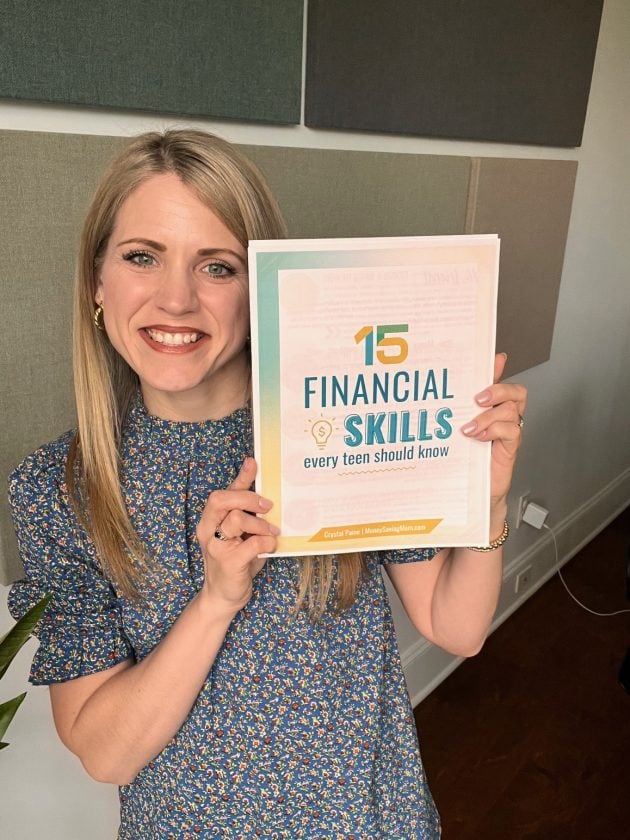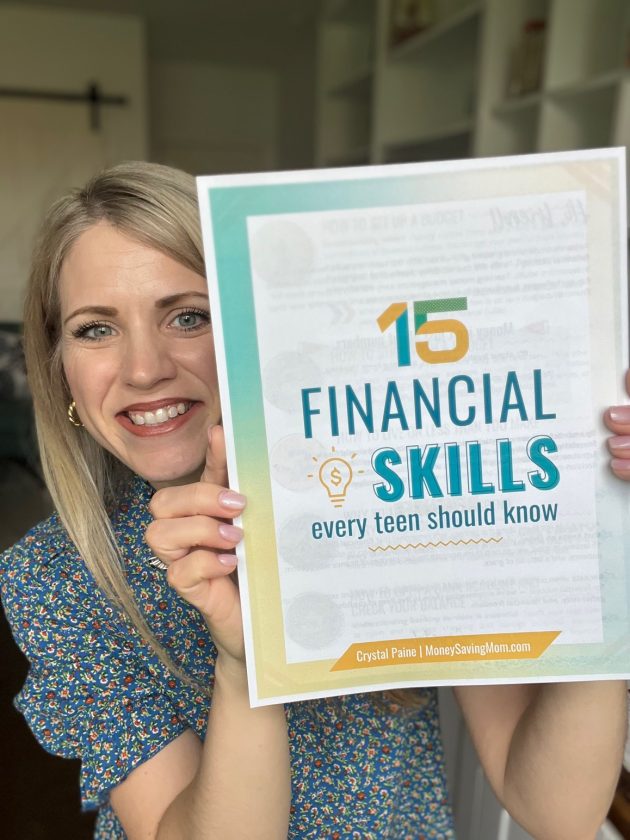
Ask Crystal: Do you give your kids an allowance?
Every Thursday in 2025, I’ll be answering a question on money and/or budgeting. If you have a question you’d love for me to answer in an upcoming post, please submit it here.
Do you give your kids an allowance before they are old enough to get a job in their teen years? How do you teach your kids to give/spend/save? -Charlotte from England
Hi, Charlotte! I love that you’re thinking intentionally about how to guide your children in money management even before they’re old enough to get a job. This is something that’s been really important to our family, too.
As parents, one of our greatest hopes is to prepare our kids with skills that will serve them well for the rest of their lives. And one of the most important life skills we can give them? How to wisely manage money.
That’s why, yes, we do give our kids money before they’re old enough to work traditional jobs. But instead of a regular allowance, we use a chore-based system that helps teach them both the value of work and how to manage money well.
Let me break it down for you…

Our Chore & Money System: Paid vs. Non-Paid Chores
When our older three were little, we created a two-tier chore system in our home: Non-Paid Chores and Paid Chores.
- Non-Paid Chores are the everyday responsibilities that come with being part of our family team — things like keeping your room clean, helping with laundry, or vacuuming. These are expected and not paid.
- Paid Chores are extra opportunities our kids can opt into once their Non-Paid Chores are done. These might include scrubbing the car, organizing a closet, or cleaning our bathroom.
We chose this system because we wanted to reward initiative and effort, not entitlement. Our kids know that money doesn’t come for free — it’s earned through hard work, just like in the real world.
Why We Pay Our Kids for Chores
Here are four big reasons we decided to pay our children for doing chores:
1. To Encourage a Strong Work Ethic
I’m so grateful for the work ethic my parents instilled in me — and I want to pass that same gift on to my kids. When our kids take initiative to do paid chores and earn money, they’re learning that effort brings rewards. They’re also learning to stick with a job until it’s done well — an invaluable lesson that goes far beyond just housework.
2. To Teach Real-Life Money Skills
From the time our kids are around three or four, we start giving them small opportunities to earn and manage money. Whether it’s bringing their own money to the store or making choices about what to save for, they’re learning real-life financial skills that will serve them for years to come.
When we’re out shopping, they can bring their own spending money and spend it however they’d like (within reason!). This helps them learn valuable money management skills and also prevents the gimme attitude that can quickly pop up when out shopping. If a child sees something they want and they ask me if we can buy it, my response is always, “Did you bring your money?”
We’ve had so many great learning moments from simple situations — like when they forget their money and can’t buy something, or when they hand their dollar bills to the cashier and get change back. These small experiences add up to big financial confidence over time.
3. To Let Them Make $3 Mistakes
Letting our kids make small money mistakes now — like spending all their money on a cheap toy that breaks in two days — helps them develop critical thinking and discernment. I’d much rather they learn from a $3 mistake today than a $3,000 mistake in their twenties.
We don’t micromanage their spending. If they ask for input, we’ll give it. But often, we step back and let them figure it out. It opens up such great conversations about decision-making, value, and delayed gratification.
4. To Encourage Generosity
We talk a lot about giving in our home. Our kids set aside part of what they earn to give — whether it’s toward Operation Christmas Child boxes, goats and chickens for families overseas, or clean water projects. Watching their hearts grow in generosity has been one of the most beautiful parts of this journey.

Need some guidance and practical encouragement to teach your kids better money-management skills. Download my brand-new resources with 15 key money lessons every teen should know — so you know exactly where to start with important conversations NOW and begin to set them up for future financial success!
In this FREE guide, you’ll learn:
- Where to even START with having conversations about money!
- The financial basics most teens aren’t learning in school.
- The #1 habit that separates financially successful young adults from those who struggle.
- Why teaching your teen about money now will save them from common financial mistakes later.
- 5 Money Mindsets that can *literally* CHANGE your teen’s future!
Download your free guide now and start preparing your teen for financial success!
How We Teach Our Kids to Give, Spend & Save
Once they start earning, we encourage our kids to divide their money into three main categories:
- Give: We encourage our kids to set aside a portion of their money to give to the local church and causes they are passionate about.
- Save: We encourage them to set savings goals — sometimes for a larger item, sometimes just to build the habit.
- Spend: This is their fun money — they get to decide how to use it (within reason!).
Over time, they begin to see the value of each category. They feel the joy of giving, the power of saving, and the freedom of spending wisely. It’s such a rewarding thing to watch!
For more encouragement, read this post on 4 Ways to Teach Your Kids Money Management.
Don’t Just Tell Them — Show Them
One of the biggest keys to all of this is modeling. Our kids hear us talking about budgeting, saving up, paying cash, and choosing contentment. They see us wait to make purchases, compare prices, and sometimes say no when something isn’t a good enough deal.
I often say: More is caught than taught.
We can talk about money all day long, but if our lives don’t reflect what we’re saying, it won’t stick. So we invite them into the process — we explain the “why” behind our financial decisions and give them a front-row seat to what it looks like to manage money with purpose.
Talk to them about how you’ve set up your budget. Show them what’s working for you. Bring them with you when you go to the bank. Explain why you’ve chosen not to use credit cards or why you pay with cash or why you buy used cars.
For more encouragement, read my post on 6 Things My Grandpas Taught Me About Financial Success.
A Few Final Encouragements
If you’re just starting out, here are a few things I’d encourage you to try:
- Set a great example. Let your kids see your intentional financial choices.
- Talk openly about money. Bring them into age-appropriate conversations.
- Help them set up a simple budget. You can use cash envelopes, a spreadsheet, or an app like You Need a Budget.
- Give them room to learn. Let them make mistakes — that’s part of the process!
Giving kids money management experience before they’re old enough for a job is not just about dollars and cents, it’s about stewardship, discipline, generosity, and setting them up for a life of wise decision-making.
I’d love to hear what this looks like in your home — or any ideas you’ve tried that worked (or didn’t!). Parenting is a journey, and we’re all learning as we go.
Related posts:
- Why We Don’t Pay For Everything For Our Kids
- 25 Summer Jobs for Teens
- Stop Waiting Until Your Kids Are Teens to Talk About Money

Leave a Comment